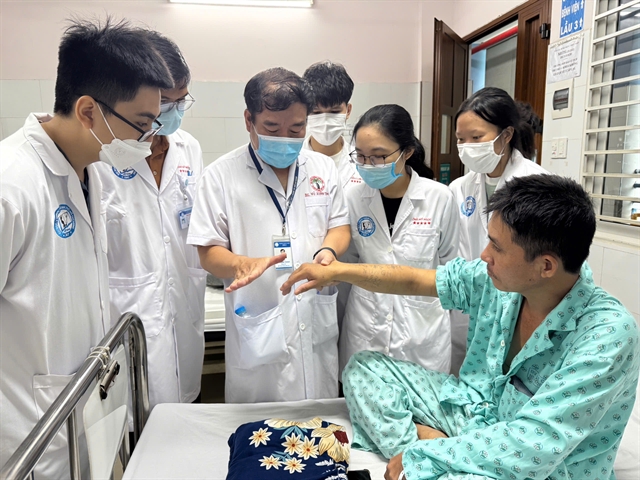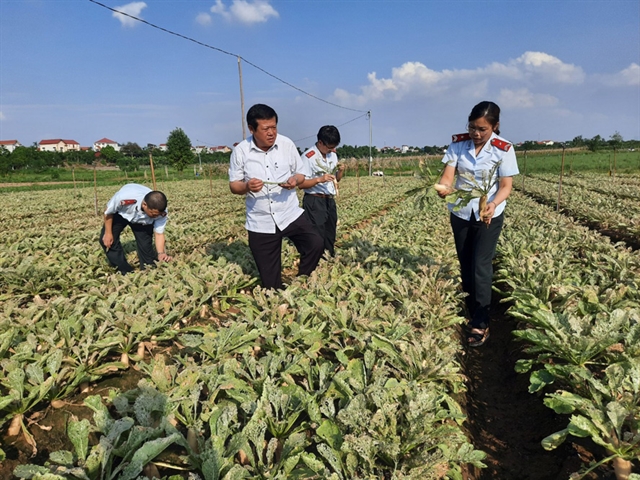 Opinion
Opinion


|
| Officials of the Hà Nội Department of Plant Production and Protection check on the use of pesticides in Tráng Việt Commune, Mê Linh District in Hà Nội. — Photo hanoimoi.com.vn |
Nguyễn Mạnh Phương, director of the Hà Nội Department of Plant Production and Protection gives an interview with Hà Nội Mới ( New Hà Nội) newspaper on the city’s plan to curtail the use of pesticides in agricultural production
What success has Hà Nội had in reducing the use of pesticides in agriculture?
The success in cutting down the use of pesticide in the agriculture practice should be attributed to the timely instruction and transfer of science and technology to Hà Nội's farmers.
In the past three years, Hà Nội's agriculture sector has issued hundreds of documents on how to use pesticides during crop cultivation.
We – the Hà Nội Department of Plant Cultivation and Protection, have issued quite a few sets of documents on how best to use pesticides during crop cultivation to farmers. We have also worked closely with all district and commune People’s Committees in Hà Nội to launch campaigns on how to use pesticides properly to Hà Nội farmers and shops selling pesticides. Adding to that, we have also worked with all communal People’s Committees in Hà Nội to publish guiding books on how to use fertiliser and pesticide for farmers.
In the past three years, the Hà Nội Department of Plant Cultivation and Protection has organised 63 workshops to train almost 6,000 shop-owners and farmers on how to properly manage and use pesticides.
What other factors have helped cut the use of pesticides in Hà Nội's agriculture?
Legal documents on the use of pesticides issued by Hà Nội authorities have also played a positive role in reducing the use of pesticides.
Adding to that, regular inspections on sales and use of plant pesticides by public agencies have also helped to reduce illegal sales of pesticides.
The total area under the System of Rice Intensification (SRI) in Hà Nội is about 60 per cent. Meanwhile, more than 5,000 ha of vegetable has been certified as organic.
Does Hà Nội face any challenges in managing the use of pesticides?
At present Hà Nội has 116 enterprises engaged in the manufacturing and selling and buying of pesticides, plus 1,158 shops buying and selling pesticides. We face quite a big challenge in the management of the sale of pesticides in the city, particularly in areas between Hà Nội and neighbouring provinces.
More than 1,700 chemical agents have been used in the pesticides – this is a big challenge for the farmers to remembers the name of chemicals and toxic degrees of each chemical. It is also a big challenge for authorities in controlling the buying and selling of these pesticides in the free market.
What should authorities do to have good management of pesticides in the free market?
We should launch regular campaigns on integrated pest management to raise farmers’ awareness on safe use of pesticides. We should also launch campaigns to raise the awareness of pesticide manufactures as well as authorities both at the grassroots level and government agencies. Besides, the Ministry of Agriculture and Rural Development should tighten registration of pesticides and eliminate any pesticides that may have harmed farmers or consumers’ health. That’s why the Ministry of Agriculture and Rural Development should work with concerned agencies to issue a legal document on the use of prohibited pesticides which may harm people’s health.
The Hà Nội Municipal People’s Committee should ask the People’s Committees, at both the district and communal levels, to play their roles in monitoring the quality of the agriculture materials and food safety together with concerned agencies, including the police and market management forces. — VNS

.jpg)


